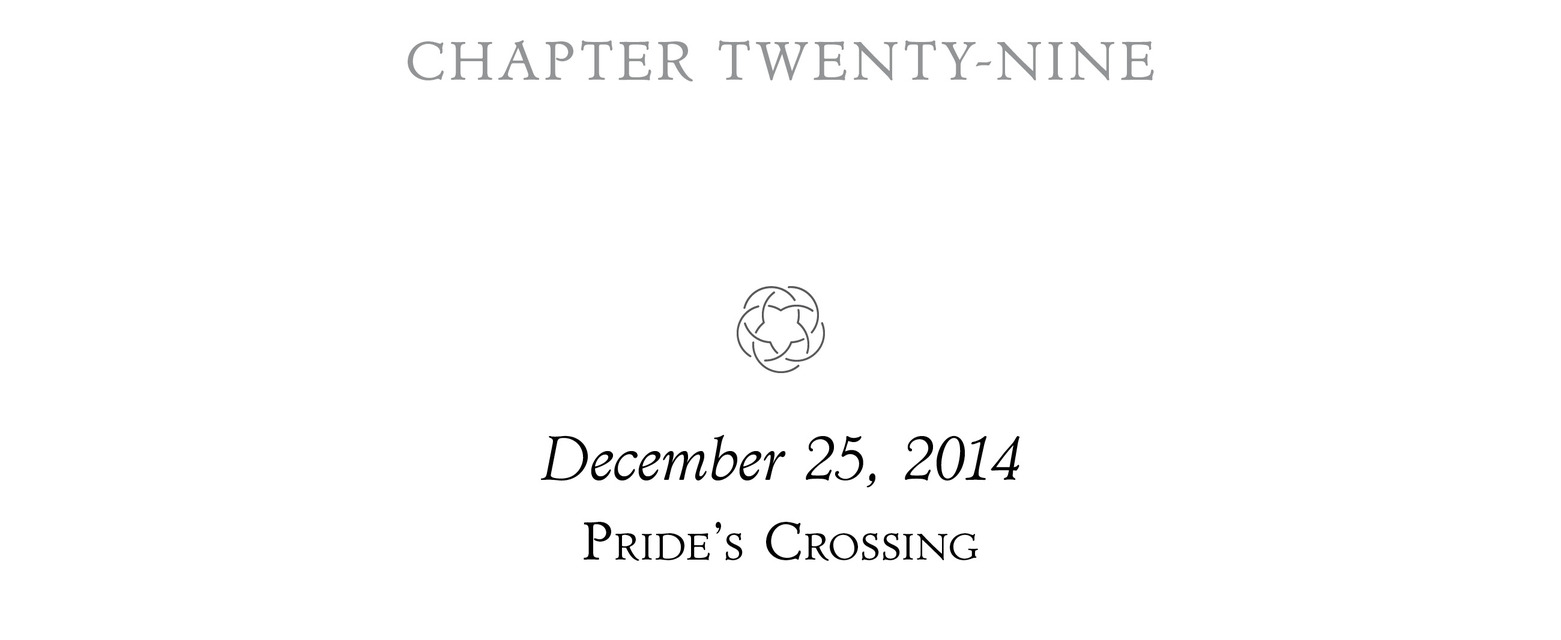

The Catholic Church embraced December as Christ’s birthday in order to appease the heathens, thereby building the number of converts to Christianity. For their part, the Puritans disdained the celebration, which reminded them not only of the Pagan devil worshipers but of the Catholics who had once persecuted them in England.
—ROSE WHELAN, The Witches of Salem
“Lovely day,” Rose said as they rode across the bridge to Pride’s Crossing on Christmas morning. She looked out at the ocean, which seemed to surround them. At least it was warmer than it had been on Thanksgiving. Today it was forty-six degrees.
Emily had offered them her driver, and Callie and Paul had accepted. They’d gone together to pick Rose up from the shelter. Paul had waited downstairs in the family room while Callie braided Rose’s wild mane into a single tail, recalling how Rose had once done the same for her. Then it was time to introduce the two most important people in her life. Callie had been worried, but the minute they met, Rose said, “Look at these lovely boots Callie just gave me,” and seemed quite at ease. Paul complimented her footwear while ushering her into the car and then climbed in and sat beside her.
“It is a beautiful day,” Callie agreed. “Strangely warm for late December.”
Paul and Callie filled the rest of the ride with small talk, and Rose was content to listen and gaze out the window, but as they turned into the driveway and she sighted Pride’s Heart, Rose grew agitated. When the car made its way around the curve of the driveway, beneath the ancient elm branches, she said, “It’s here.”
“What’s here?”
“The tree.”
“Those are elms,” Callie said. “Not oaks.”
“Not those trees,” Rose said, leaning forward in her seat. “It’s here. I don’t see it yet, but I can feel it. The hanging tree.”
Callie and Paul exchanged a glance.
As they pulled up to the front entrance, and the driver went around to open the car door, Rose jumped out and dashed toward the lawn and the ocean beyond.
Paul and Callie scrambled to catch up. By the time they reached her, she was standing near the orangerie at the edge of the cliff in front of the lone oak on the Whitings’ property.
“This is it,” Rose said, putting her ear to its massive trunk. “It has to be.”
“What’s going on?” Paul whispered.
“She thinks that’s the hanging tree,” Callie said.
“I know it is. I saw it floating down the North River in my dream,” Rose said, growing more excited. “The North River flows right into Beverly Harbor, and it comes out here.”
“This tree was planted by my great-great-grandfather in the late eighteen hundreds,” Paul said gently, “before the big house was built, back when he lived at what is now the boathouse. It was never in the North River, Rose.”
Rose shook her head. “It’s telling me I’ve come to the right place.”
“You have come to the right place,” Callie said, talking slowly as if to a child. “The Whitings have invited us for Christmas dinner.” She looked at the tree, an old and beautiful oak. “Let’s go into the house now. We can come back to see this after dinner.”
Rose planted herself under the tree. “Thank you, but I’ll stay right here.”
Callie was speechless for a moment. Until now, she hadn’t been overly troubled by the extent of Rose’s obsession. “It might be warm for December, but it’s still chilly. Come inside.”
“You go inside. I’m staying.”

“I’m so sorry,” Callie said to Emily. Hildy had been holding dinner for Rose, and now it was in danger of overcooking. “I just don’t know how to get her to come in.”
Since they’d arrived an hour earlier, she and Paul had tried everything they could think of to lure Rose inside. She wouldn’t budge. At Emily’s insistence, Callie had taken Rose a heavier coat and a blanket.
“I suppose we should just go ahead and have dinner without her,” Callie said, trying and failing to look Emily in the eye. “I really don’t know what else to do.”
“I think we should join her,” Emily said. “An alfresco Christmas dinner is something we haven’t tried before.”
Paul stared at his mother. “Oh, Dad’s going to love that.”
“As it turns out, Finn is ill and won’t be joining us for dinner,” Emily said, dismissing his concern.
“What’s wrong with him?” Paul asked.
Emily didn’t answer. “Put your coats back on and let’s go outside.”
Paul exchanged a glance with Callie but let the subject drop. With a few brief directions to the staff, the moving process began. The glass and wrought-iron table that stood outside the orangerie was moved under Rose’s oak, and four places were set. If the staff thought this was bizarre holiday behavior, their expressions did not give their thoughts away.
Rose wouldn’t leave her tree to join them at the table, so they made her a plate and tray and served her where she sat. The table was close enough to engage in conversation, though. Rose said, “How do you do?” when introduced to Emily.
“I’m quite well. It’s a pleasure to meet you, Rose.”
The meal was much simpler than it had been on Thanksgiving; a crown roast, with wild rice and apples, Parker House rolls, sweet potatoes, and brussels sprouts. With the addition of Christmas poppers and the party hats and favors they yielded, it almost felt like a child’s birthday party. Without Finn present, Emily did not bother to say grace.
Rose was the only one who didn’t put on her party hat, and yet she seemed almost amused by the sight of the others at the table. But she was preoccupied, and soon she retreated to silence, listening to the tree as if it were telling her something. Not wanting to interrupt Rose’s reverie, they sat quietly, every so often breaking the stillness with some inane bit of small talk.
Emily kept glancing at the house, as if fully expecting Finn to make an appearance and growing more and more annoyed when he didn’t materialize. “As I mentioned before, Callie,” she said, doing her best to sound upbeat, “you are welcome to move into the boathouse when Paul goes back to Italy in February.”
“Thank you. That’s very kind,” Callie said flatly. The last thing she wanted to do was talk about Paul going back.
“And if Rose would like to stay with you on occasion, I’m sure that could be arranged.”
Paul shot his mother a look. “I’m sure Dad would approve that plan.” He said it as if sincere, but his mother picked up his subtext.
“I think it would be good for all concerned.”
Callie said nothing. Luckily Rose was ignoring the entire exchange.
If conversation had been sparse before this remark, now it became almost nonexistent.
They stayed outside at the table long after dessert, until the sun had set and it was growing dark. Rose had two pieces of apple pie as well as a piece of the savory mince.
“I promised to have you back in Salem by six,” Callie said to Rose. “We have to get going.”
“I’m not leaving,” Rose said.
“You may come back anytime you want, Rose,” Emily offered. “I’ll send my driver for you. This can be your tree. I know you already have a tree in Salem. Now you can have one in Pride’s Crossing as well. You may sit under it as much as you’d like.”
Rose considered, looking wary. “Anytime I want?”
“Anytime,” Emily said.
“Okay,” Rose said, taking the hand Paul extended to help her up.
They hustled Rose into the waiting car, and as they crossed the Beverly Bridge on their way back to Salem, Paul asked, “What did the tree say to you, Rose? I saw you listening.”
“They’re here,” Rose said.
“They’re here?” Callie repeated. “That’s what the tree said?”
“The missing remains of those executed in 1692?” Paul asked.
“Remains, yes,” Rose said, staring out the window, “and their unresting souls.”
“That’s what the tree said to you?”
“That and something else.”
“What else?” Callie asked, steeling herself, not certain she wanted an answer.
“Sometimes the only healing is death.”

It took Paul a while to calm Callie down after they dropped Rose back at the shelter.
“I have to acknowledge that Rose is sicker than I thought,” Callie said.
“That was always a possibility, wasn’t it?”
“Like Zee says, it’s denial. And what was that bit about Rose staying at the boathouse? How could that ever work?” Callie asked, confused.
“That was an interesting offer to say the least,” Paul said.
Now Callie’s mood took a dive. “I don’t want to think about you going back to Italy.”
“Let’s not think about that today.”
Neither of them wanted to go back to Pride’s Heart right away. Instead, Paul had Emily’s driver take them over to Nahant, stopping at the old fort, where the ocean view opened up all the way to the Boston skyline.
They didn’t get back until after eight. “Come to the boathouse?”
“I think I’ll check on your mother first.”
Paul walked her to the door but didn’t go inside. “My father’s not ill,” he said. “He’s just being cruel. He wanted Marta to come to dinner, and when she refused, he played sick. He doesn’t care how my mother feels about the whole thing. He never has. I’m afraid of what I might say if I run into him.”
“I’m guessing it’s not ‘Merry Christmas.’ ”
“No, definitely not ‘Merry Christmas.’ ”

Callie found Emily in the orangerie.
“Where’s Paul?” Emily asked.
“He went back to the boathouse,” Callie said. “He’s trying to avoid Finn.”
“Smart boy.” Emily closed her eyes for a moment. When she opened them, she looked directly at Callie. “I’m not afraid of dying, you know.”
Callie was shocked—especially since Emily was doing so much better.
“I don’t think we need to talk about you dying.”
“Oh, my dear,” Emily replied, sinking farther into the downy cushions of the couch. “We both know how this thing is going to end.”
With cancer, death was always a possibility. But it wasn’t something Callie saw on Emily. She’d been fooled before, of course. There were patients she’d thought she was helping who’d succumbed more rapidly than she’d expected, but Emily didn’t seem like one of them. Ever since the day Callie had lifted her pain, Emily had been looking better and better. Today, sitting on the couch, she seemed the picture of health.
“I’ll tell you what I am afraid of.”
“What’s that?”
“I’m afraid of leaving my son unfinished.”
“ ‘Unfinished.’ ” The word resonated as odd. “I’m not sure I understand.”
“Children of privilege,” Emily said, “confuse having resources with being resourceful. I’m afraid for my son. I’m not sure he has the…survival skills he’s going to need. He’s a good man,” Emily continued. “Any faults he might have come from his youth and privilege. Which is my fault, and Finn’s, not his.”
That Emily believed she was going to die soon bothered Callie in a way she hadn’t anticipated. Somehow, in the past weeks, she’d come to feel really attached to the woman. It was the same way she’d felt about her first foster mother. Callie didn’t want to remember how that had ended.